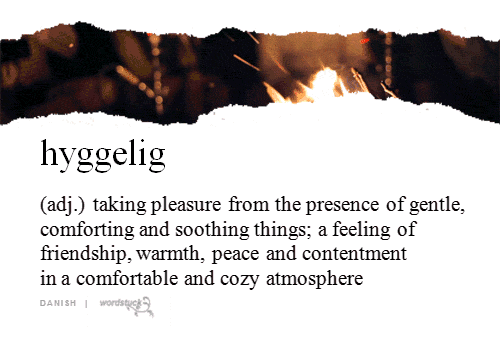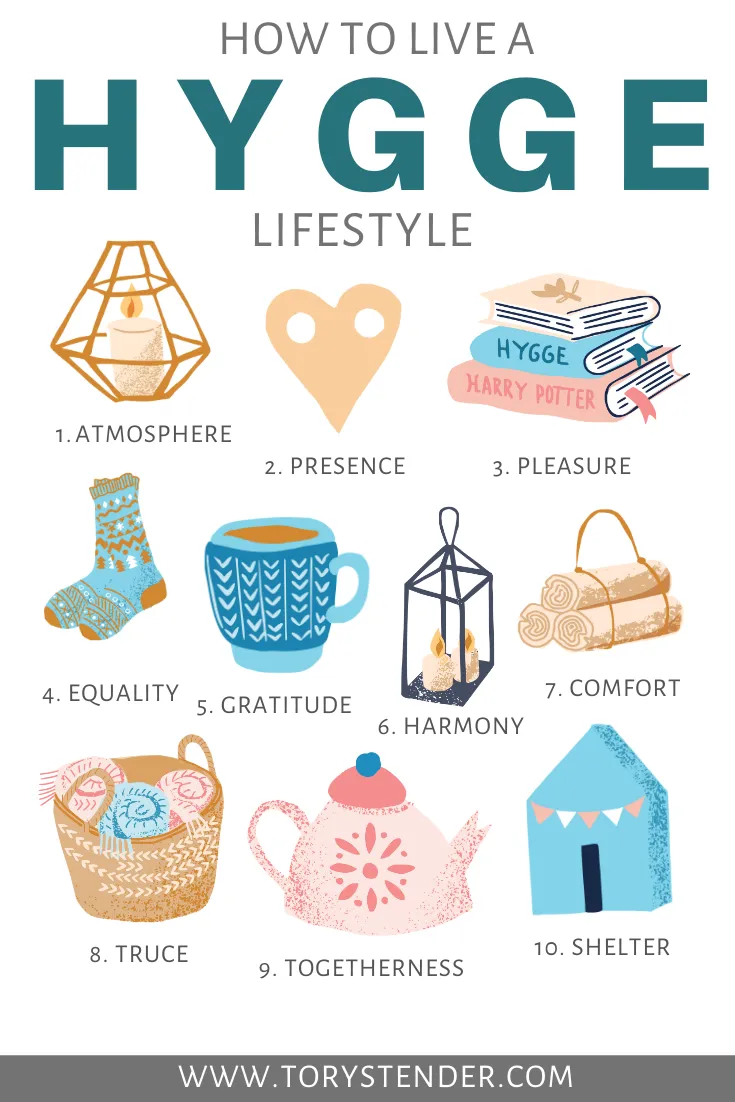Hello peeps! @ailindigo here :)
For the 30th Untranslatable Word we're going to Europe, specifically Denmark. This week's word is about a concept very deeply rooted in the Danish sense of togetherness. Some people say the only way to understand this word is by visiting Denmark.

Gif by Wordstuck
hyggelig
After reading what this word was about and despite being right now not enjoying the cold weather, I really felt like visiting Denmark and be in front of a fire experiencing some hyggge.
hyggelig literally means nice, friendly, cozy, comfortable, snug. *
The word ’hyggelig’ comes from a Norwegian word meaning “well-being.” It first appeared in Danish writing in the 18th century and has been embraced by the Danes ever since. Hyggelig is usually translated as “coziness” but its meaning is more than that, it refers to a feeling, mood, atmosphere and spirit. It contains something pleasant, relaxed, safe, comfortable and recognizable. This word refers to a concept that is 100% danish and it's said to be behind Denmark's success as the happiest country in the world. *
This concept is hygge, and if you ask a Dane man what hygge is, he will answer that "it's sitting in front of the fireplace on a cold night, dressed in a thick wool sweater while drinking a mulled wine with sugar and spices and petting your dog lying next to you." Hygge is actually an attitude towards life, it has more to do with people’s behavior towards each other. It is the art of creating intimacy: a sense of camaraderie and contentment rolled into one. Perhaps, while also being in cozy surroundings. *
Enven though Denmark's long and cold winters influences everything, hygge isn't exclusively related to this season. During winter danish people have only 4 hours of light per day and temperature gets very low, which means they spend more time inside and look for ways to entertain themselves at home. The idea is to relax and feel "at home" as much as possible, forgetting about life's worries.

Even, Hygge is trying to be exported to other countries mainly with Scandinavian-themed restaurants, cafes and bars. These are places with intimate spaces, whose decoration lacks uniformity and the focus is on comfort food. "The rest of the world seems to be gradually realizing what the Danes have known for generations: that spending relaxed, cozy time with friends and family, sipping coffee with cake or beer, can be good for the soul," says Helen Russell, author of the book The Year of Living Danishly: Uncovering the Secrets of the World's Happiest Country.
Most often hyggelig is associated with social relations – you get together to have a hyggelig time, but you can also have a hyggelig time alone, as hyggelig is the concept of creating warmth and well-being whether it be with others or for yourself. It often involves food, candy or snacks; hyggelig times aren' overwhelming at all but the opposite, it's about being nice to yourself: having a nice time, not punishing or denying yourself anything. According to Helen "In Denmark there is not a lot of forced deprivation. What is tried is to be kind to yourself and others. Danes do not overeat or drink excessively, nor do they purge food or drink. Nor do they go on diets with a rebound effect."
I agree with Hygge being what we make of it, no matter if we're facing a cold winter or we're in the middle of summer, I think we can create a hyggelig moment if we really want to as it's more about creating a moment of intimacy and enjoyment either alone or with people, though I think it's a more people-focused time. Right now we're entering winter and with no doubt I'm looking forward to have lasting hyggelig moments with myself, just trying to chill in the present moment and not rush too much, waiting for the sun to come back again.
What do you think? Is hygge behind Denmark's happiness? Do you have hyggelig times? Please feel free to let me know what you think in the comments!
Thank you very much for passing by! And if you have an Untranslatable Word you'd like to suggest, please don't hesitate to do so! :)
Previous Untranslatable Words:
#1: Torschlusspanik
#2: Mono no aware
#3: Rasāsvāda
#4: Cavoli riscaldati
#5: Nefelibata
#6: Sturmfrei
#7: Jootha
#8: bilita mpash
#9: resfeber
#10: Vāde mēcum
#11: sankofa
#12: annus mirabilis
#13: voorpret
#14: pikit mata
#15: ranorànilac
#16: gagung
#17: gumusservi
#18: yaourter
#19: nunchi
#20: flâneur - the aesthetic experience of wandering through the city
#21: xibipíío - how the Pirahã deconverted a Christian man
#22: aduantas - rambling between two nuances
#23: Eh - Canada's proud politeness
#24: Janteloven - the egalitarian nature of Nordic countries
#25: Dadirri - finding the answers by contemplating ourselves
#26: catalepsy - doubting my senses
#27: kiasu - Singaporeans's survival instinct
#28: dustsceawung - We are stardust
#29: yoisho - encouragement and reminder of strength
This content is part of a new series to get more people interested on languages and how they, perception and culture are related!
Exclusively for the Hive Cross Culture Community, the community for language exchange and cross-cultural purposes.
If you'd like to be part of the discussion don't hesitate to hop into the Hive Language and Culture Exchange Discord server! As well as subscribing to the Hive Cross Culture Community so you don't miss any new word comming ;) We'll be sharing a new Untranslatable Word each week!

